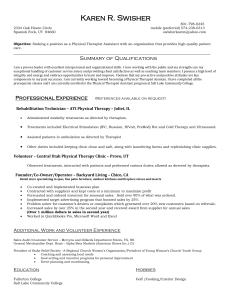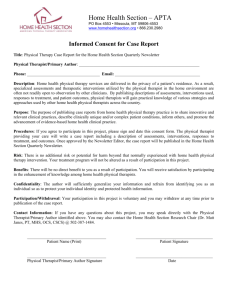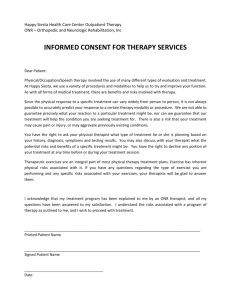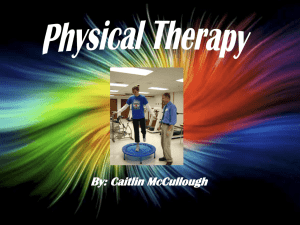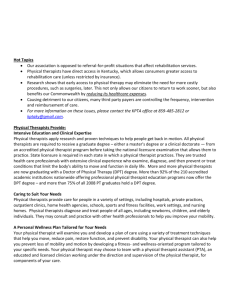A Physical Therapy: Healing People, Changing Lives
advertisement
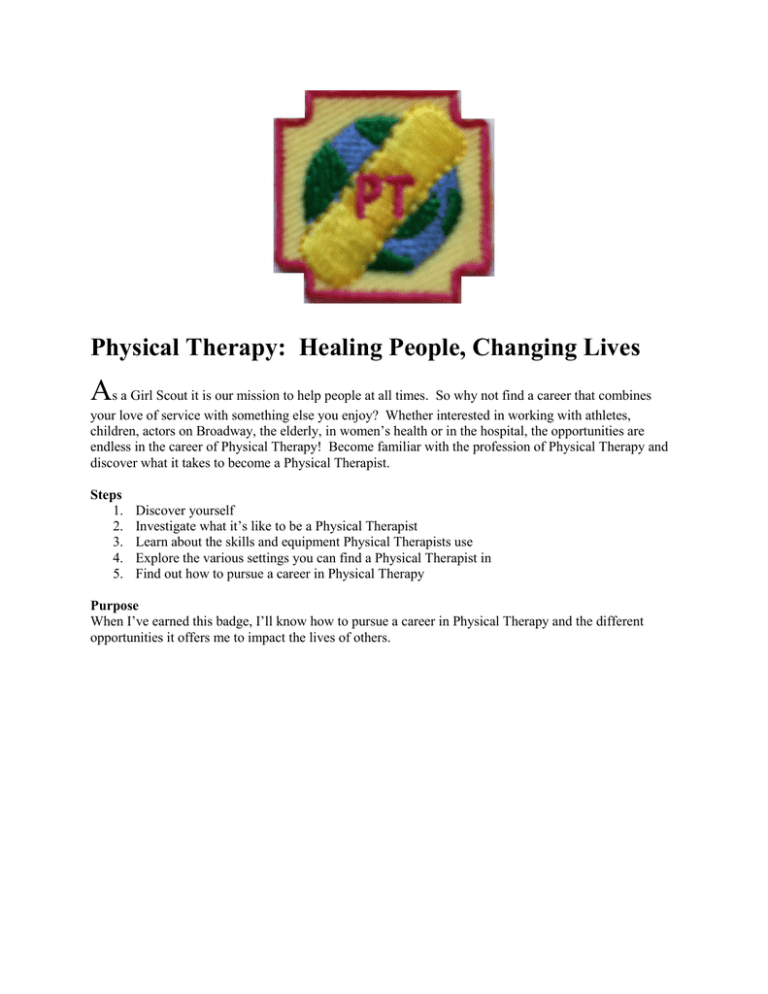
Physical Therapy: Healing People, Changing Lives As a Girl Scout it is our mission to help people at all times. So why not find a career that combines your love of service with something else you enjoy? Whether interested in working with athletes, children, actors on Broadway, the elderly, in women’s health or in the hospital, the opportunities are endless in the career of Physical Therapy! Become familiar with the profession of Physical Therapy and discover what it takes to become a Physical Therapist. Steps 1. 2. 3. 4. 5. Discover yourself Investigate what it’s like to be a Physical Therapist Learn about the skills and equipment Physical Therapists use Explore the various settings you can find a Physical Therapist in Find out how to pursue a career in Physical Therapy Purpose When I’ve earned this badge, I’ll know how to pursue a career in Physical Therapy and the different opportunities it offers me to impact the lives of others. STEP 1 Discover yourself When pursuing any career, it is important to find something you are interested in. Physical Therapy is a field with many opportunities to work in different settings and with different types of people. There are many specialties that a person can choose from to find a path that fits their interests. Find out if Physical Therapy fits you. CHOICES - DO ONE: Knowledge is Power What subjects in school are you currently interested in? What type of things would you like to learn how to do? Go online or to the library and look up the classes students majoring in Physical Therapy have to take. Write down five classes you would have to take to become a Physical Therapist. Then write down three additional classes that seem interesting to you. If you want to know more, invite a Physical Therapy student to give you and your group the inside scoop. OR People Pleaser Throughout your life you will always be working with people. Think about the different groups you’ve worked with through Girl Scouts, school, clubs or other activities. Find out what types of people you enjoyed working with. Find out why would children, athletes, elderly, or even your parents need PT? OR Skill Builder Physical Therapists need to have strong interpersonal skills. Find out what interpersonal skills are. Discover when these skills are used and if you’ve acquired them over the years. Write down five interpersonal skills you possess. Then identify five skills you could improve on and how. STEP 2 Investigate what it’s like to be a Physical Therapist Once you find a career you may be interested in, it’s important to take the next step and become familiar with it. It’s hard to know if you will enjoy a career if you have never been exposed to it. Take the time to get some exposure or experience in the world of a Physical Therapist. CHOICES- DO ONE: Private Investigator Go online or to the library and find out what the life of a Physical Therapist is like. How long do they work? How much are they paid? What other health professionals do they work with? What can they do? What kind of patients do they treat? OR Walk in their shoes Ask a local Physical Therapist or Physical Therapy student if you can shadow them for a day or a few hours. Observe what their average day consists of. Find out what are the pros and cons of the profession. Determine if it’s something you would like to do. OR PT Pen Pal Send an email or write a letter to a local Physical Therapy clinic or school. Use the following questions to get you started: 1. What is your work schedule like? 2. What kinds of people do you work with? 3. What skills must you have to be a Physical Therapist? 4. What do you feel are the pros of being a Physical Therapist? 5. What do you feel are the cons of being a Physical Therapist? Feel free to add on any other questions you may have to get an idea of what their lives are like. STEP 3 Learn about skills and equipment Physical Therapists use Physical Therapists go through several years of education and training before they are able to treat the people they come in contact with. Discover the skills they learn and see if there are any you can use. CHOICES- DO ONE: Hands on Healing Physical Therapists use soft tissue techniques to help treat parts of the body that suffer from injuries. Take the opportunity to learn about massage and the benefits it has on the body. Use the local library or internet to find two techniques you can learn and practice them with your friends and family. OR It’s SHOCKING Did you know your funny bone is actually a nerve? Find it on your body and then what nerve it is. Take it a step further and find a simple explanation of what a motor unit is. Then understand how electricity is conducted throughout the body to help us move. Explore what equipment physical therapist use that requires electricity to help the body! OR Pressures On Blood pressure is a very important aspect of a person’s health. Knowing its impact, Physical Therapists check a patient’s blood pressure to make sure it is safe for them to exercise. Being familiar with healthy blood pressure is good to know for you and your family. Learn what good blood pressure levels are and about the stages of hypertension. Discover what lifestyle changes can be made by a person with this condition. Then put your knew knowledge in action and learn how to take a person’s blood pressure. STEP 4 Explore the various settings a Physical Therapist can be found Have you ever thought about what type of environment you want to work in? Do you want it to be fast paced or slow? What type of building do you want to enter each day or what type of people do you want to encounter? Physical therapy is not limited to a type of building, certain group or specific health condition. Explore the many fields Physical Therapists are involved in. Maybe one will be interesting to you. CHOICES- DO ONE: In the Hospital You don’t have to just be a nurse or doctor to work in the hospital. Physical therapists can be found there too and work in a variety of departments in the hospital. A few are listed below. Research one or visit a PT department in a local hospital. Oncology Orthopedic Infectious Disease Neonatal Intensive Care Intensive Care Cardiac OR In the Home Imagine instead of going to work in an office building, clinic or hospital, you go to work at a person’s home. Physical Therapists can be found in nursing homes or the actual homes of their patients. Find out why a physical therapist treats a person at home. What conditions do these people have? How do physical Therapists help them? Is this something you would be interested in? OR Explore Visit a local Physical Therapy clinic in one of the following settings: Sports & Orthopedics- Athletic related injuries Geriatrics- Work with older adults Pediatrics- Work with children Inpatient Outpatient Sports Acute Care Hospital Physical Therapy Department Inpatient Rehabilitation-Amputees, Stroke Women’s Health Clinic Cardiac Rehabilitation Aquatic Therapy STEP 5 Find out how to pursue a career in Physical Therapy Physical Therapy is an exciting career with many opportunities to improve the quality of life for a variety of people. Figure out what it takes to pursue a career in this medical field. Planning now and being prepared to go down the path to becoming a Physical therapist can simplify your journey. CHOICES - DO ONE: Do your homework Go online and research the steps you must take to become a Physical Therapist. What type of degree do you need? What are good undergraduate majors to pursue that will fulfill the requirements to get into a Physical Therapy program? What tests do you have to take? The American Physical Therapy Association website that can help answer many of these questions. Go to http://www.apta.org/apta/directories/accreditedschools.aspx?navID=10737423273. Find 3 schools and learn about them. OR Speak with a professional Invite a Physical therapy student or Physical Therapist to speak with your group. Ask them about their journey to becoming a physical therapist, what steps they took and advice they may have. OR Visit a local school Many schools have open houses and are available for tours. Use the APTA website http://www.apta.org/apta/directories/accreditedschools.aspx?navID=10737423273 to find Physical Therapy schools in your area and visit one. Ask about the requirements to get in, get a tour of the campus, and even sit in on a class if possible.
